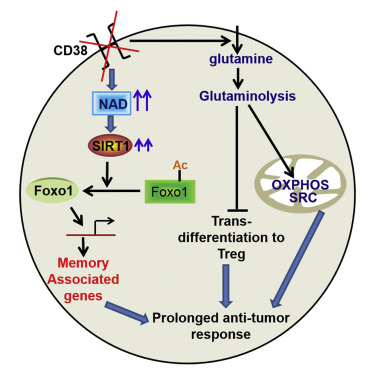当前位置:
X-MOL 学术
›
Cell Metab.
›
论文详情
Our official English website, www.x-mol.net, welcomes your
feedback! (Note: you will need to create a separate account there.)
CD38-NAD+Axis Regulates Immunotherapeutic Anti-Tumor T Cell Response.
Cell Metabolism ( IF 27.7 ) Pub Date : 2018-Jan-09 , DOI: 10.1016/j.cmet.2017.10.006 Shilpak Chatterjee 1 , Anusara Daenthanasanmak 2 , Paramita Chakraborty 1 , Megan W Wyatt 2 , Payal Dhar 2 , Shanmugam Panneer Selvam 3 , Jianing Fu 2 , Jinyu Zhang 2 , Hung Nguyen 2 , Inhong Kang 4 , Kyle Toth 1 , Mazen Al-Homrani 1 , Mahvash Husain 1 , Gyda Beeson 5 , Lauren Ball 5 , Kristi Helke 4 , Shahid Husain 6 , Elizabeth Garrett-Mayer 7 , Gary Hardiman 8 , Meenal Mehrotra 4 , Michael I Nishimura 9 , Craig C Beeson 5 , Melanie Gubbels Bupp 10 , Jennifer Wu 2 , Besim Ogretmen 3 , Chrystal M Paulos 2 , Jeffery Rathmell 11 , Xue-Zhong Yu 2 , Shikhar Mehrotra 1
Cell Metabolism ( IF 27.7 ) Pub Date : 2018-Jan-09 , DOI: 10.1016/j.cmet.2017.10.006 Shilpak Chatterjee 1 , Anusara Daenthanasanmak 2 , Paramita Chakraborty 1 , Megan W Wyatt 2 , Payal Dhar 2 , Shanmugam Panneer Selvam 3 , Jianing Fu 2 , Jinyu Zhang 2 , Hung Nguyen 2 , Inhong Kang 4 , Kyle Toth 1 , Mazen Al-Homrani 1 , Mahvash Husain 1 , Gyda Beeson 5 , Lauren Ball 5 , Kristi Helke 4 , Shahid Husain 6 , Elizabeth Garrett-Mayer 7 , Gary Hardiman 8 , Meenal Mehrotra 4 , Michael I Nishimura 9 , Craig C Beeson 5 , Melanie Gubbels Bupp 10 , Jennifer Wu 2 , Besim Ogretmen 3 , Chrystal M Paulos 2 , Jeffery Rathmell 11 , Xue-Zhong Yu 2 , Shikhar Mehrotra 1
Affiliation

|
Heightened effector function and prolonged persistence, the key attributes of Th1 and Th17 cells, respectively, are key features of potent anti-tumor T cells. Here, we established ex vivo culture conditions to generate hybrid Th1/17 cells, which persisted long-term in vivo while maintaining their effector function. Using transcriptomics and metabolic profiling approaches, we showed that the enhanced anti-tumor property of Th1/17 cells was dependent on the increased NAD+-dependent activity of the histone deacetylase Sirt1. Pharmacological or genetic inhibition of Sirt1 activity impaired the anti-tumor potential of Th1/17 cells. Importantly, T cells with reduced surface expression of the NADase CD38 exhibited intrinsically higher NAD+, enhanced oxidative phosphorylation, higher glutaminolysis, and altered mitochondrial dynamics that vastly improved tumor control. Lastly, blocking CD38 expression improved tumor control even when using Th0 anti-tumor T cells. Thus, strategies targeting the CD38-NAD+ axis could increase the efficacy of anti-tumor adoptive T cell therapy.
中文翻译:

CD38-NAD +轴调节免疫治疗抗肿瘤T细胞反应。
增强的效应子功能和持久的持久性分别是Th1和Th17细胞的关键属性,是有效的抗肿瘤T细胞的关键特征。在这里,我们建立了离体培养条件,以产生杂合的Th1 / 17细胞,该细胞在体内长期维持,同时保持其效应子功能。使用转录组学和代谢谱分析方法,我们表明Th1 / 17细胞增强的抗肿瘤特性取决于组蛋白脱乙酰基酶Sirt1的NAD +依赖性活性的增加。Sirt1活性的药理或遗传抑制削弱了Th1 / 17细胞的抗肿瘤潜力。重要的是,NADase CD38表面表达降低的T细胞固有地具有更高的NAD +,增强的氧化磷酸化,更高的谷氨酰胺分解和改变的线粒体动力学,从而大大改善了肿瘤的控制。最后,即使使用Th0抗肿瘤T细胞,阻断CD38的表达仍可改善肿瘤控制。因此,针对CD38-NAD +轴的策略可以提高抗肿瘤过继性T细胞疗法的疗效。
更新日期:2018-02-02
中文翻译:

CD38-NAD +轴调节免疫治疗抗肿瘤T细胞反应。
增强的效应子功能和持久的持久性分别是Th1和Th17细胞的关键属性,是有效的抗肿瘤T细胞的关键特征。在这里,我们建立了离体培养条件,以产生杂合的Th1 / 17细胞,该细胞在体内长期维持,同时保持其效应子功能。使用转录组学和代谢谱分析方法,我们表明Th1 / 17细胞增强的抗肿瘤特性取决于组蛋白脱乙酰基酶Sirt1的NAD +依赖性活性的增加。Sirt1活性的药理或遗传抑制削弱了Th1 / 17细胞的抗肿瘤潜力。重要的是,NADase CD38表面表达降低的T细胞固有地具有更高的NAD +,增强的氧化磷酸化,更高的谷氨酰胺分解和改变的线粒体动力学,从而大大改善了肿瘤的控制。最后,即使使用Th0抗肿瘤T细胞,阻断CD38的表达仍可改善肿瘤控制。因此,针对CD38-NAD +轴的策略可以提高抗肿瘤过继性T细胞疗法的疗效。






























 京公网安备 11010802027423号
京公网安备 11010802027423号